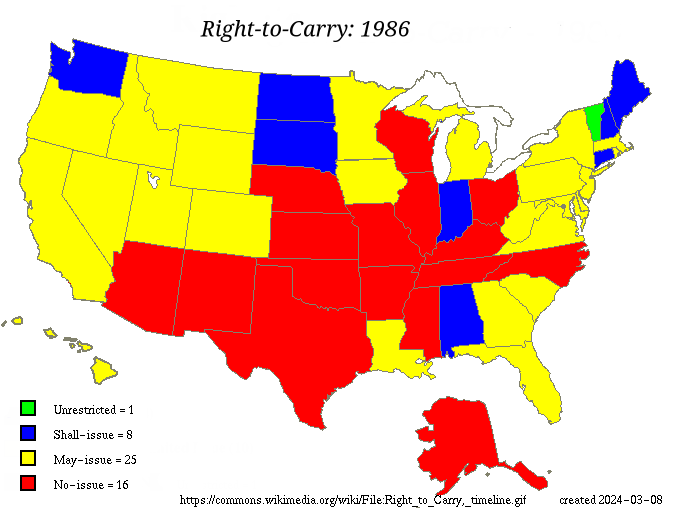Constitutional Carry continues to gain members. One to three states are likely in 2020.
Constitutional Carry is the return to a close approximation of the state of law in the United States when the Bill of Rights was ratified in 1791. At that time there were no permits required to carry weapons in public places, either openly or concealed.
Concealed weapons were common and popular. Examples are knives, sword canes, and Queen Anne's or "muff" pistols.
This state of law persisted in the United States for 30 years, until nearly all the founding fathers were dead.
The most likely state to pass a bill restoring Constitutional Carry in 2020 is Tennessee. Governor Bill Lee has publicly supported passing Constitutional Carry, as have the majority leaders in both the Senate and the House. A formal bill has yet to be submitted in the legislature.
Tennessee Firearms Association (TFA) has received a copy of an amendment said to be the heart of the proposed legislation.
The proposed legislation primarily creates an exception to existing law for either carrying a handgun, either openly or concealed. From TFA:
Section 1 of the proposed law does not alter TCA 39-17-1307(a) by “removing the Class C misdemeanor” – it is still there. What this bill does is it creates a new subpart (g) that says this:There are several other limitations, but, generally, if a person can legally obtain a Tennessee concealed carry permit, under the new law they will be able to carry a handgun openly or concealed, without a permit.
It is an exception to the application of subsection (a) that a person is carrying, whether openly or concealed, a handgun and:
(1) The person meets the qualifications for the issuance of an enhanced handgun carry permit under § 39-17-1351(b) and (c);
(2) The person lawfully possesses the handgun; and
(3) The person is in a place where the person has a right to be.
The amendment creates an exception to a charge of illegal carrying if certain conditions are met.
Louisiana recently had a Constitutional Carry bill introduced in the legislature, as HB72. HB72 is similar to the Tennessee proposal, in that it creates an exception to existing law. If a person is not prohibited from possessing the firearm, and it was not illegally obtained or manufactured by the person who is carrying it; no permit would be required to carry. From HB72:
95. Illegal carrying of weaponsThe Louisiana bill differs from Tennessee in that it strikes from the law the requirement to obtain a permit in order to carry a concealed handgun.
L. The provisions of Paragraph (A)(1) of this Section shall not apply to a person if all of the following conditions are met:
(1) The person is not prohibited from possessing the firearm under R.S.1614:95.1 or any other state or federal law.
(2) The firearm was not illegally manufactured or obtained by the person.
The Tennessee proposal has a peculiarity found in the Constitutional Carry states of Idaho, Wyoming, and North Dakota: It restricts Constitutional Carry to state residents.
This portion of the law might be struck down if a court challenge is mounted. There is strong precedent that a state may not discriminate against non-residents in such a broad based law, under the equal protection clause of the Fourteenth Amendment, especially when dealing with a fundamental right.
Cases are unlikely because Idaho recognizes all other state's permits, North Dakota recognizes 39 state permits, and Wyoming recognizes 34 state permits.
Depending on who makes the count, and how Constitutional Carry is defined, there are 16 states that have restored Second Amendment rights to an approximation of what they were when the Second Amendment was ratified in 1791.
No state which has restored Constitutional Carry has seen an increase in violent gun crime or in fatal gun accidents related to Constitutional Carry.
To restrict a Constitutionally protected right, the State should have to show a law is narrowly tailored to achieve a compelling government interest. If Constitutional Carry does not increase violent gun crime or fatal gun accidents, there is no compelling government interest.
Vermont has always had Constitutional Carry since 1791.
In 2003, Alaska passed Constitutional Carry to restore the exercise of Second Amendment rights.
In 2010, Arizona passed Constitutional Carry.
In 2011, Wyoming passed Constitutional Carry.
In 2013, Arkansas passed Act 746 into law. It is effectively Constitutional Carry. Some county prosecutors threaten prosecution, but it has not happened.
In 2015, Kansas, and Maine became Constitutional Carry club members.
In 2016, Idaho, Missouri, West Virginia, and Mississippi became Constitutional Carry states.
In 2017, New Hampshire, and North Dakota passed Constitutional Carry.
In 2019, South Dakota, Oklahoma, and Kentucky passed Constitutional Carry.
Alabama, Indiana, Iowa, Texas, Georgia, South Carolina, Ohio, Utah, Wisconsin, and Michigan have had some movement on Constitutional Carry bills. Republican Governor Herbert of Utah vetoed a weak Constitutional Carry bill. Montana's Democrat Governor Bullock vetoed a Constitutional Carry bill twice.
Most bills will die in the legislative process, but one to three more states are likely to restore Constitutional Carry in 2020.
©2020 by Dean Weingarten: Permission to share is granted when this notice and link are included.







2 comments:
It's a shame we have to pass laws in order to exercise a Constitutional right...
If they continue to require a permit or a license to carry then everyone in Tennessee should be required to get a permit or a license to attend church. Rights are guaranteed under the federal constitution all rights are equal all rights cross state lines because we are citizens of this country where ever we are in it. We are residents of the state we live in we are citizens of the country we live in and this country is required to guarantee our rights in this country.
Post a Comment